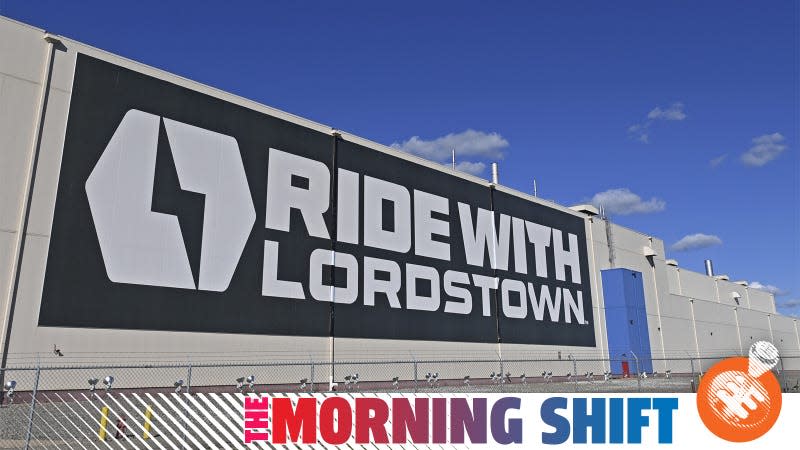Foxconn Doesn't Care How This Ends

Foxconn doesn’t have a care in the world, things are looking up for Nissan and Subaru in North America and Panasonic is taking its sweet time with the batteries Tesla ordered from it. All that and more in this edition of The Morning Shift for May 11, 2023.
1st Gear: Foxconn Will Keep the House in the Divorce
If you haven’t been following the news very closely, Lordstown is running out of money and says Foxconn, who purchased its namesake Ohio factory from the electric truck startup, is falling behind on a promised investment. Foxconn says that Lordstown has breached their agreement by getting almost kicked off the stock market, so it’s not obligated to pay up.
Read more
The thing is, no matter what happens to Lordstown, Foxconn has a factory tooled to produce EVs, in the hottest EV-production region in the world. So it’s not particularly worried — about anything. In the words of its Chairman, Young Liu, by way of Bloomberg:
“We are taking a multi-customer approach to optimize and allocate this capacity we have in Ohio,” Liu said, adding that the recently enacted Inflation Reduction Act has made the factory more attractive. “In the past couple of years, Foxconn has been proactively seeking customers. Now, the interest is two-way; we are also being approached by potential customers as well — I’m talking about traditional auto OEMs.” [...]
“We have seen in the past month how tough disruption is for the EV industry,” Liu said, adding that the issue with Lordstown Motors won’t impact Foxconn’s approach to production at the plant. “I would prefer to talk less in public and instead do more to come up with solutions for our stakeholders.”
Liu capped it all off by saying that Foxconn’s next two years are all about “active courtship of new customers,” which is a very powerful position to be in. Lordstown is hanging on Foxconn’s every move, and Foxconn is blankly staring back, metaphorically saying “I don’t think about you.” The Taiwanese electronic manufacturing company wants to do for EV brands what it does for Apple and other tech OEMs. It’s keeping the house either way, so what does it have to fear?
2nd Gear: Nissan Expects Good News to Keep on Rolling
The once-beleaguered Japanese automaker actually had a strong 2022, with operating profit rising by more than half, even as deliveries dropped by 15 percent worldwide. It has no reason to believe its good fortune won’t continue, particularly off the back of strong North American sales in the months ahead. From Automotive News:
Nissan on Thursday said it expects retail deliveries in North America to soar 29 percent to 1.32 million vehicles in the current fiscal year ending March 31, 2024. The market will anchor what Nissan predicts will be a 21 percent expansion in global sales to 4 million vehicles. [...]
If the North America sales target is achieved, that market would exceed China as Nissan’s biggest and post its healthiest result since the pandemic and global semiconductor shortage.
“We see opportunities in the U.S.,” Uchida said.
Nissan is off to a good start. Nissan Group’s U.S. deliveries rose 17 percent to 235,818 vehicles in the January-March quarter, ending a streak of six consecutive quarterly declines.
But even so, the 1.32 million outlook falls short of the 1.62 million sold in North America in the fiscal year ended March 31, 2020. And it remains far below the 2 million-plus vehicles that were achieved during the era of former CEO Carlos Ghosn before his arrest in November 2018.
North American sales fell 14 percent to 1.02 million vehicles in the fiscal year ended March 31, while Europe, excluding the Russian market Nissan withdrew from, rose 5.5 percent to 305,000.
Nissan’s business in North America is also getting a boost from improved revenue per vehicle.
Revenues per vehicle have expanded 20 percent for the Rogue crossover and 21 percent for the Altima sedan, for example, over the past three fiscal years, Nissan said. The Pathfinder SUV was up 48 percent, and the Frontier pickup saw revenue per vehicle climb 36 percent.
So Nissan’s looking healthier these days, mostly because it figured out how to increase margins on its priciest models. Nissan hasn’t slid itself upmarket in the way Mazda has, though it’s certainly rejecting the volume-before-everything mantra of the Ghosn years. That’s a sound strategy in this age of manufacturing bottlenecks and rising sticker prices.
3rd Gear: Meet GM Envolve
That’s the name of GM’s new commercial vehicles unit, which will also include parts and telematics divisions. The idea is to unite everything for fleet customers under one brand, so pitches over the phone are a bit less awkward than they are today. From Reuters:
GM executives said the reorganization is aimed at making it easier for commercial fleet customers to negotiate electric and combustion vehicle purchases and sign up for services and software offerings that GM is developing to generate revenue after the vehicle sale.
Previously, commercial customers would get called on by representatives from GM’s traditional vehicle brands, its new BrightDrop delivery van unit, a new energy services operation and the OnStar telematics unit, said Steve Hill, GM’s vice president for commercial growth strategies.
“We were basically stepping on each other,” he said during a briefing for media. Hill said the restructuring is not aimed at reducing staff.
GM is battling with Ford and Stellantis NV for a bigger share of the commercial fleet market.
It seems the BrightDrop brand will persist through all of this however, which is smart as GM just introduced it. Electrek adds that Dominos and AutoZone will employ Envolve services as they field Chevy Bolt EVs, which is also a win for GM. They’ve got to do something with those unsold Bolts.

 Yahoo Autos
Yahoo Autos 